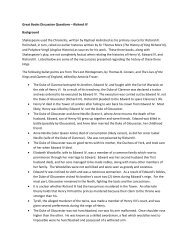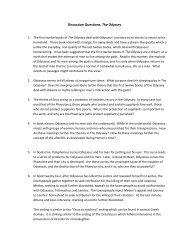1 Wordsworth's Literary Precedents: Derivation and ... - Peter Ponzio
1 Wordsworth's Literary Precedents: Derivation and ... - Peter Ponzio
1 Wordsworth's Literary Precedents: Derivation and ... - Peter Ponzio
You also want an ePaper? Increase the reach of your titles
YUMPU automatically turns print PDFs into web optimized ePapers that Google loves.
e admired, other people chose to write in an elevated, poetic style. This re-affirmation<br />
of a dislike of affected language, first developed in the Preface, is a primary reason that<br />
he rejected the writings of the Neo-Classical poets, <strong>and</strong> he singled-out the poetry of<br />
Dryden <strong>and</strong> Pope as examples of an affected style.<br />
In a controversial passage in the Appendix, he remarks that for works of<br />
imagination <strong>and</strong> sentiment, there is no essential difference between works of poetry <strong>and</strong><br />
prose works:<br />
…namely, that in works of imagination <strong>and</strong> sentiment, for of these only have I<br />
been treating, in proportion as ideas <strong>and</strong> feelings are valuable, whether the<br />
composition be in prose or in verse, they require <strong>and</strong> exact one <strong>and</strong> the same<br />
language, Meter is but adventitious to composition, <strong>and</strong> the phraseology for<br />
which that passport is necessary, even where it might be graceful at all, will be<br />
little valued by the judicious. (800) (Italics mine)<br />
In the Preface to the Third Edition of the Lyrical Ballads, Wordsworth attempted<br />
to clarify his notions of the use of imagination in the writing of poetry. He believed that<br />
imagination was not merely the art of reproducing or copying something that the poet<br />
observed, but that the mind operated with the material presented to it, <strong>and</strong> somehow<br />
transformed this material into a poetic composition. In attempting to describe this<br />
transformative power of the imagination, Wordsworth writes that<br />
the Imagination also shapes <strong>and</strong> creates; <strong>and</strong> how By innumerable processes;<br />
<strong>and</strong> in none does it more delight than in that of consolidating numbers into unity,<br />
<strong>and</strong> dissolving <strong>and</strong> separating unity into number, - alternations proceeding from,<br />
<strong>and</strong> governed by, a sublime consciousness of the soul in her own mighty <strong>and</strong><br />
almost divine powers. ( 804)<br />
In the Essay Supplementary to the Third Edition of Lyrical Ballads, Wordsworth<br />
completes his formal discourse on poetic theory by noting that the “appropriate business<br />
of poetry …is to treat of things not as they are, but as they appear: not as they exist by<br />
themselves, but as they seem to exist to the senses, <strong>and</strong> to the passions” (807). This<br />
4




